The Scope of Artificial Intelligence in the Education System Report
VerifiedAdded on 2022/09/10
|8
|1448
|25
Report
AI Summary
This report investigates the scope and impact of Artificial Intelligence (AI) within the education system. It begins with an abstract summarizing the study's focus on AI's role in transforming education from traditional to smart systems. The introduction outlines the research overview, the statement of the problem (the increasing popularity of AI in education and its associated costs and risks), the study's aims and objectives (to explore the positive and negative contributions of AI), research questions (how AI reforms learning and its impacts), and hypotheses. The report also details the relevance and limitations of the study, along with the research methodology, which includes both qualitative (literature review) and quantitative (survey) approaches. The report aims to provide insights into how AI is reshaping education and its implications for students and educators, drawing on a mixed-methods approach to gather data and analyze the evolving landscape of AI in learning.
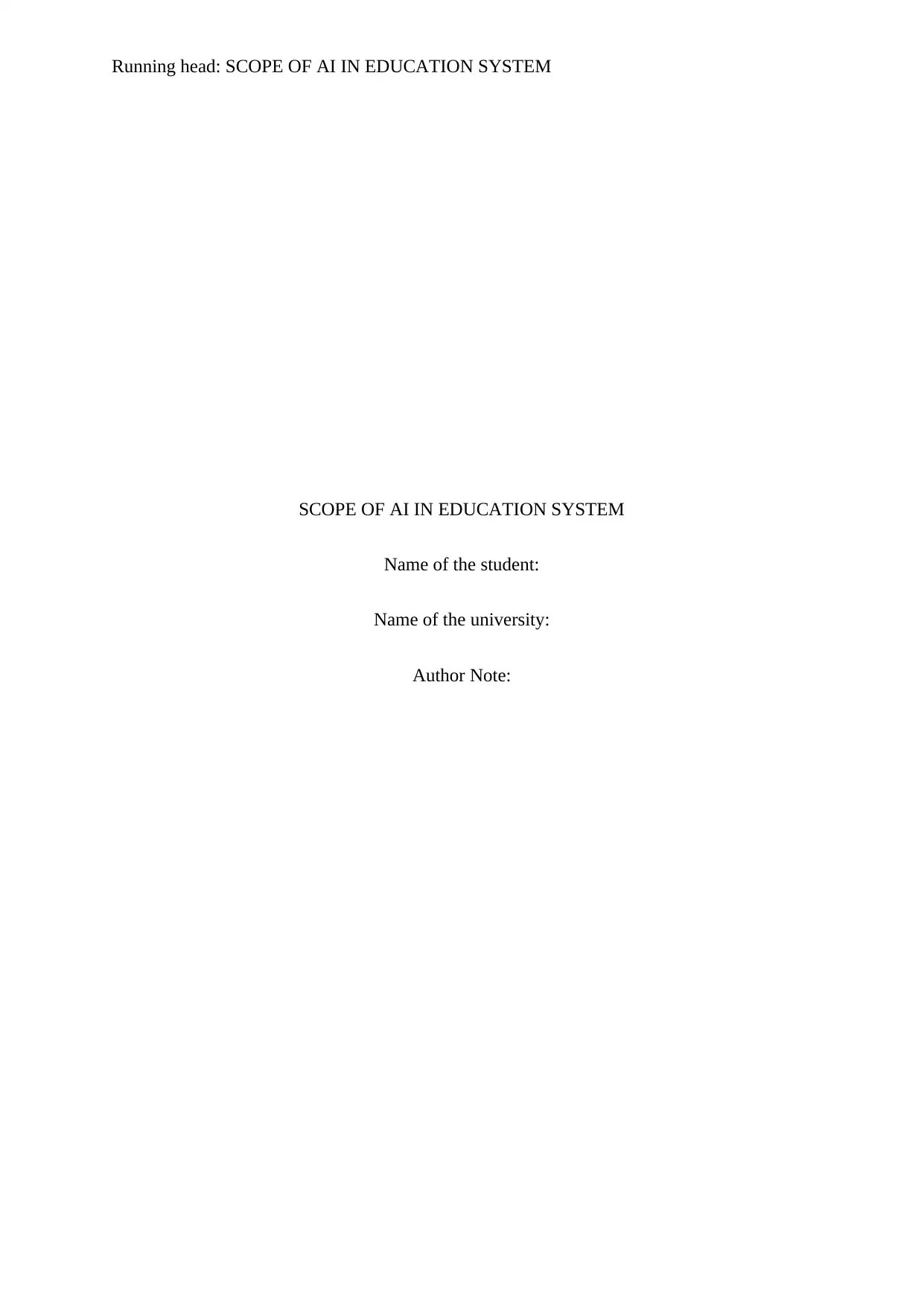
Running head: SCOPE OF AI IN EDUCATION SYSTEM
SCOPE OF AI IN EDUCATION SYSTEM
Name of the student:
Name of the university:
Author Note:
SCOPE OF AI IN EDUCATION SYSTEM
Name of the student:
Name of the university:
Author Note:
Paraphrase This Document
Need a fresh take? Get an instant paraphrase of this document with our AI Paraphraser
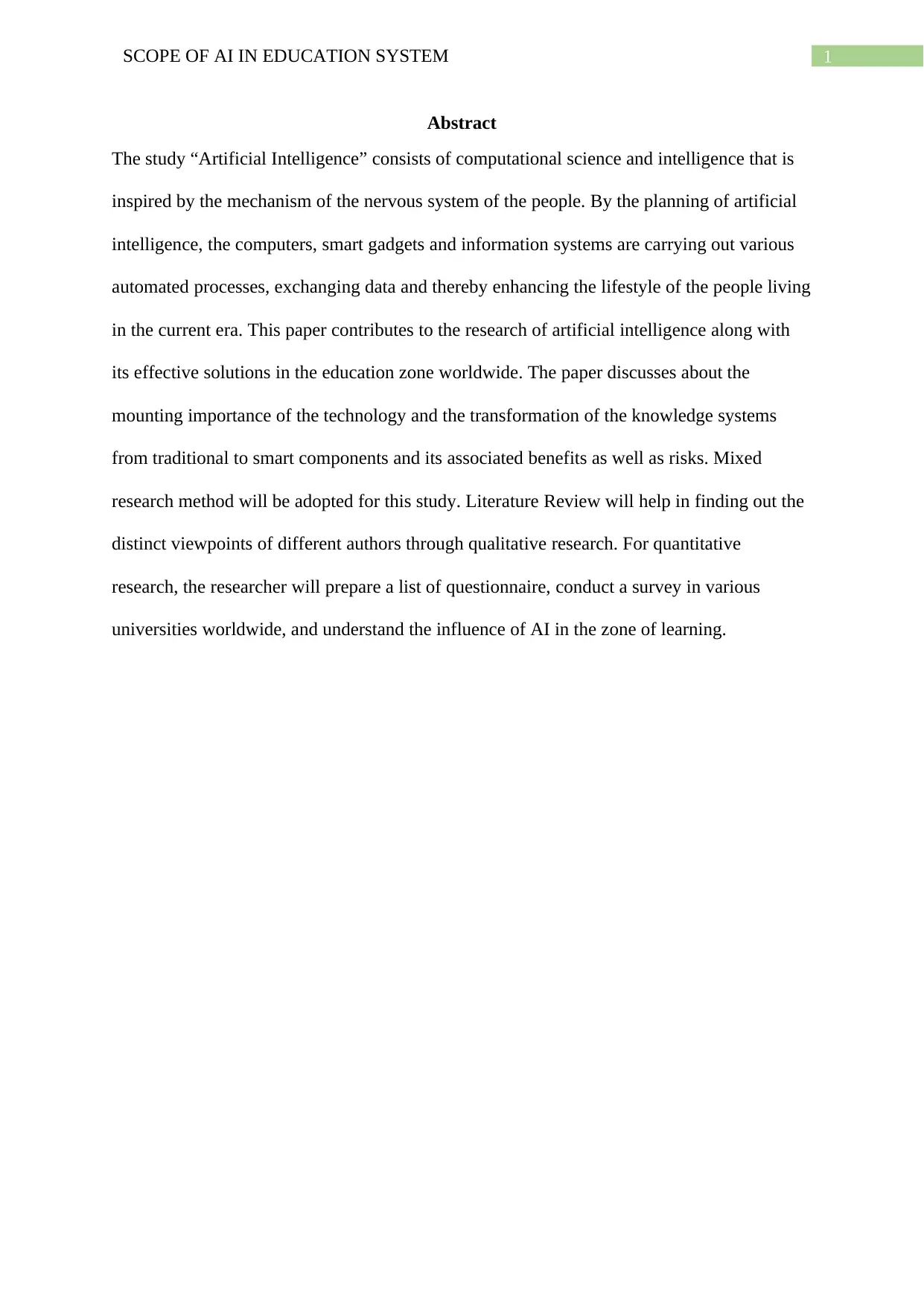
1SCOPE OF AI IN EDUCATION SYSTEM
Abstract
The study “Artificial Intelligence” consists of computational science and intelligence that is
inspired by the mechanism of the nervous system of the people. By the planning of artificial
intelligence, the computers, smart gadgets and information systems are carrying out various
automated processes, exchanging data and thereby enhancing the lifestyle of the people living
in the current era. This paper contributes to the research of artificial intelligence along with
its effective solutions in the education zone worldwide. The paper discusses about the
mounting importance of the technology and the transformation of the knowledge systems
from traditional to smart components and its associated benefits as well as risks. Mixed
research method will be adopted for this study. Literature Review will help in finding out the
distinct viewpoints of different authors through qualitative research. For quantitative
research, the researcher will prepare a list of questionnaire, conduct a survey in various
universities worldwide, and understand the influence of AI in the zone of learning.
Abstract
The study “Artificial Intelligence” consists of computational science and intelligence that is
inspired by the mechanism of the nervous system of the people. By the planning of artificial
intelligence, the computers, smart gadgets and information systems are carrying out various
automated processes, exchanging data and thereby enhancing the lifestyle of the people living
in the current era. This paper contributes to the research of artificial intelligence along with
its effective solutions in the education zone worldwide. The paper discusses about the
mounting importance of the technology and the transformation of the knowledge systems
from traditional to smart components and its associated benefits as well as risks. Mixed
research method will be adopted for this study. Literature Review will help in finding out the
distinct viewpoints of different authors through qualitative research. For quantitative
research, the researcher will prepare a list of questionnaire, conduct a survey in various
universities worldwide, and understand the influence of AI in the zone of learning.
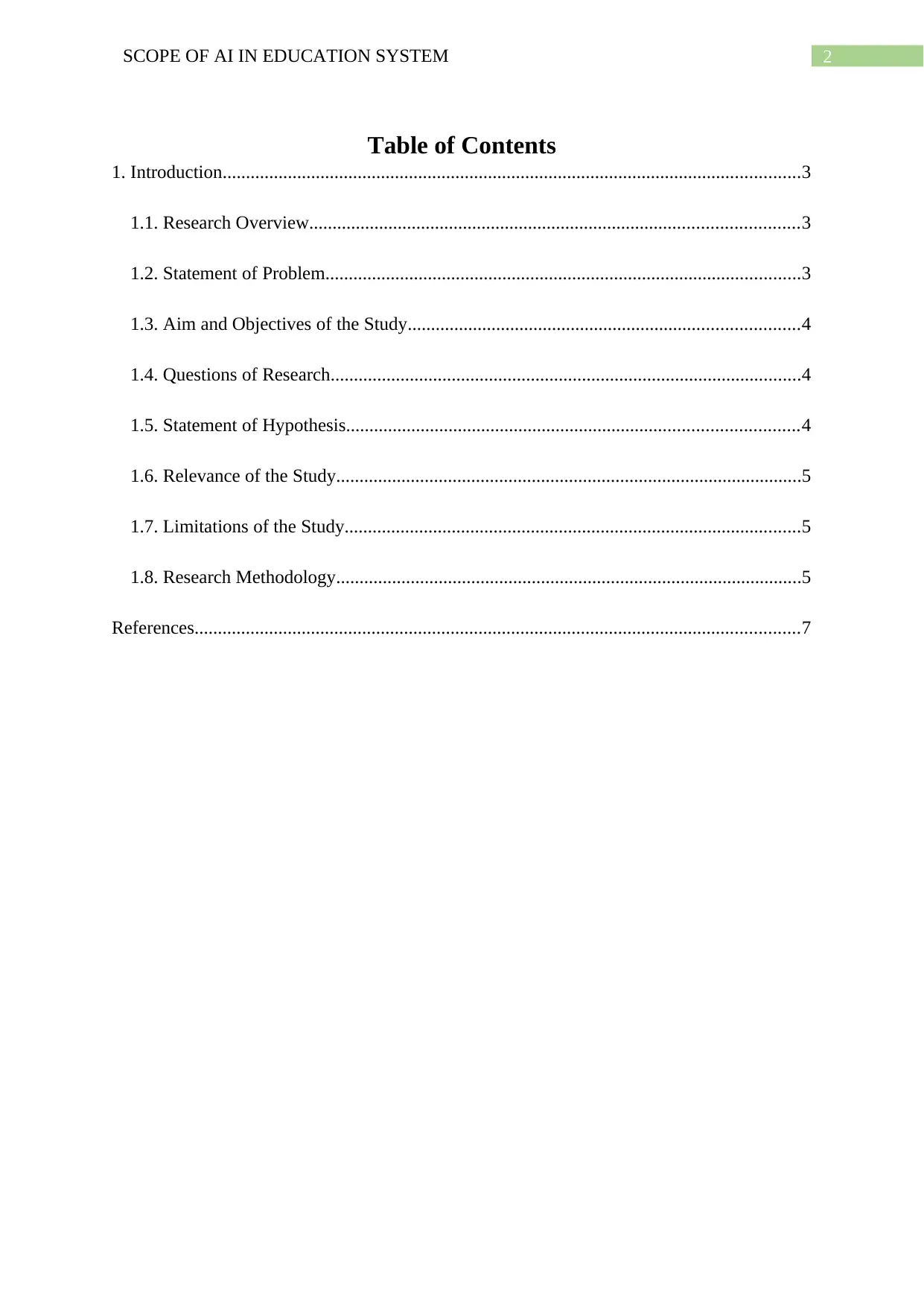
2SCOPE OF AI IN EDUCATION SYSTEM
Table of Contents
1. Introduction............................................................................................................................3
1.1. Research Overview.........................................................................................................3
1.2. Statement of Problem......................................................................................................3
1.3. Aim and Objectives of the Study....................................................................................4
1.4. Questions of Research.....................................................................................................4
1.5. Statement of Hypothesis.................................................................................................4
1.6. Relevance of the Study....................................................................................................5
1.7. Limitations of the Study..................................................................................................5
1.8. Research Methodology....................................................................................................5
References..................................................................................................................................7
Table of Contents
1. Introduction............................................................................................................................3
1.1. Research Overview.........................................................................................................3
1.2. Statement of Problem......................................................................................................3
1.3. Aim and Objectives of the Study....................................................................................4
1.4. Questions of Research.....................................................................................................4
1.5. Statement of Hypothesis.................................................................................................4
1.6. Relevance of the Study....................................................................................................5
1.7. Limitations of the Study..................................................................................................5
1.8. Research Methodology....................................................................................................5
References..................................................................................................................................7
⊘ This is a preview!⊘
Do you want full access?
Subscribe today to unlock all pages.

Trusted by 1+ million students worldwide
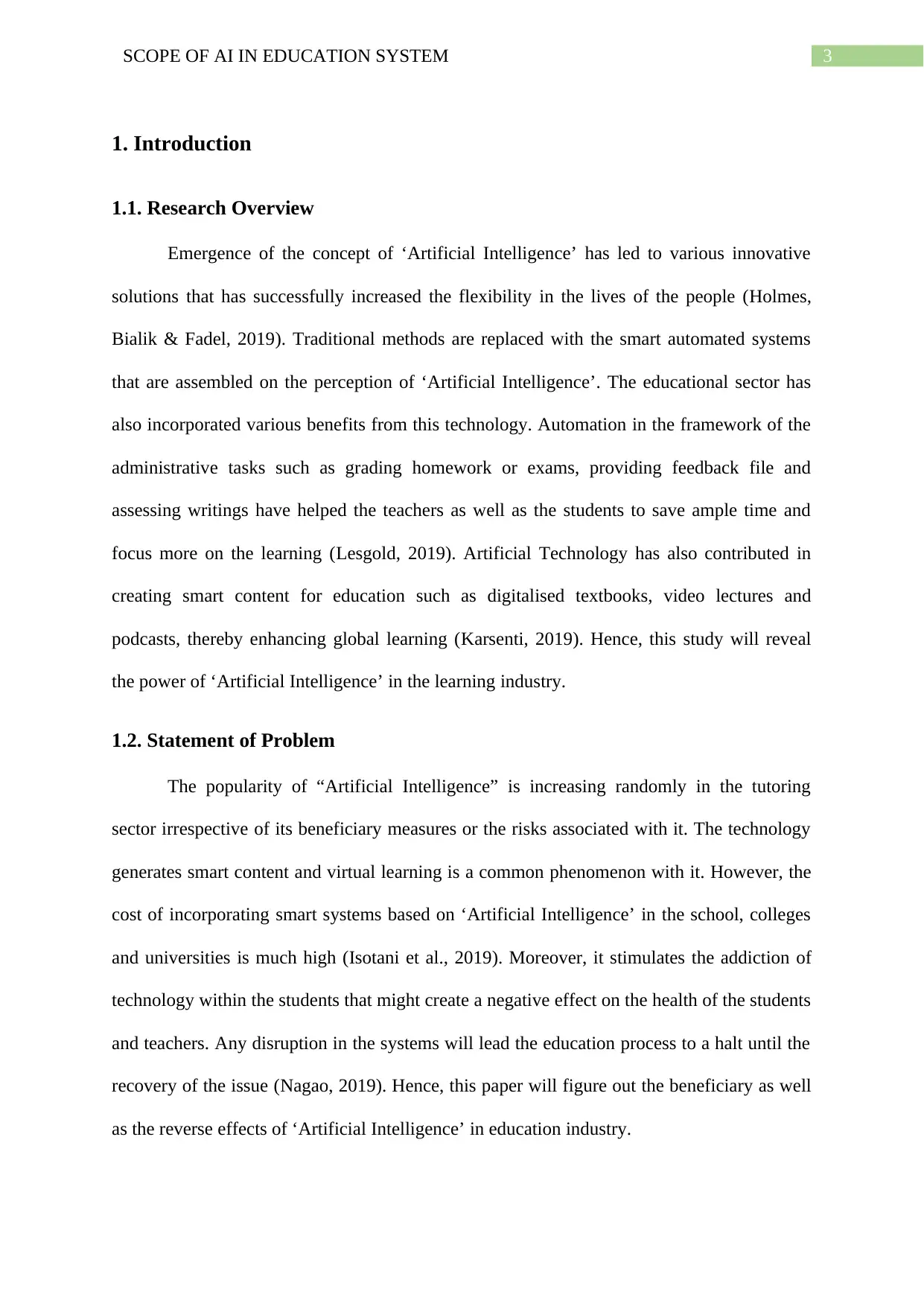
3SCOPE OF AI IN EDUCATION SYSTEM
1. Introduction
1.1. Research Overview
Emergence of the concept of ‘Artificial Intelligence’ has led to various innovative
solutions that has successfully increased the flexibility in the lives of the people (Holmes,
Bialik & Fadel, 2019). Traditional methods are replaced with the smart automated systems
that are assembled on the perception of ‘Artificial Intelligence’. The educational sector has
also incorporated various benefits from this technology. Automation in the framework of the
administrative tasks such as grading homework or exams, providing feedback file and
assessing writings have helped the teachers as well as the students to save ample time and
focus more on the learning (Lesgold, 2019). Artificial Technology has also contributed in
creating smart content for education such as digitalised textbooks, video lectures and
podcasts, thereby enhancing global learning (Karsenti, 2019). Hence, this study will reveal
the power of ‘Artificial Intelligence’ in the learning industry.
1.2. Statement of Problem
The popularity of “Artificial Intelligence” is increasing randomly in the tutoring
sector irrespective of its beneficiary measures or the risks associated with it. The technology
generates smart content and virtual learning is a common phenomenon with it. However, the
cost of incorporating smart systems based on ‘Artificial Intelligence’ in the school, colleges
and universities is much high (Isotani et al., 2019). Moreover, it stimulates the addiction of
technology within the students that might create a negative effect on the health of the students
and teachers. Any disruption in the systems will lead the education process to a halt until the
recovery of the issue (Nagao, 2019). Hence, this paper will figure out the beneficiary as well
as the reverse effects of ‘Artificial Intelligence’ in education industry.
1. Introduction
1.1. Research Overview
Emergence of the concept of ‘Artificial Intelligence’ has led to various innovative
solutions that has successfully increased the flexibility in the lives of the people (Holmes,
Bialik & Fadel, 2019). Traditional methods are replaced with the smart automated systems
that are assembled on the perception of ‘Artificial Intelligence’. The educational sector has
also incorporated various benefits from this technology. Automation in the framework of the
administrative tasks such as grading homework or exams, providing feedback file and
assessing writings have helped the teachers as well as the students to save ample time and
focus more on the learning (Lesgold, 2019). Artificial Technology has also contributed in
creating smart content for education such as digitalised textbooks, video lectures and
podcasts, thereby enhancing global learning (Karsenti, 2019). Hence, this study will reveal
the power of ‘Artificial Intelligence’ in the learning industry.
1.2. Statement of Problem
The popularity of “Artificial Intelligence” is increasing randomly in the tutoring
sector irrespective of its beneficiary measures or the risks associated with it. The technology
generates smart content and virtual learning is a common phenomenon with it. However, the
cost of incorporating smart systems based on ‘Artificial Intelligence’ in the school, colleges
and universities is much high (Isotani et al., 2019). Moreover, it stimulates the addiction of
technology within the students that might create a negative effect on the health of the students
and teachers. Any disruption in the systems will lead the education process to a halt until the
recovery of the issue (Nagao, 2019). Hence, this paper will figure out the beneficiary as well
as the reverse effects of ‘Artificial Intelligence’ in education industry.
Paraphrase This Document
Need a fresh take? Get an instant paraphrase of this document with our AI Paraphraser
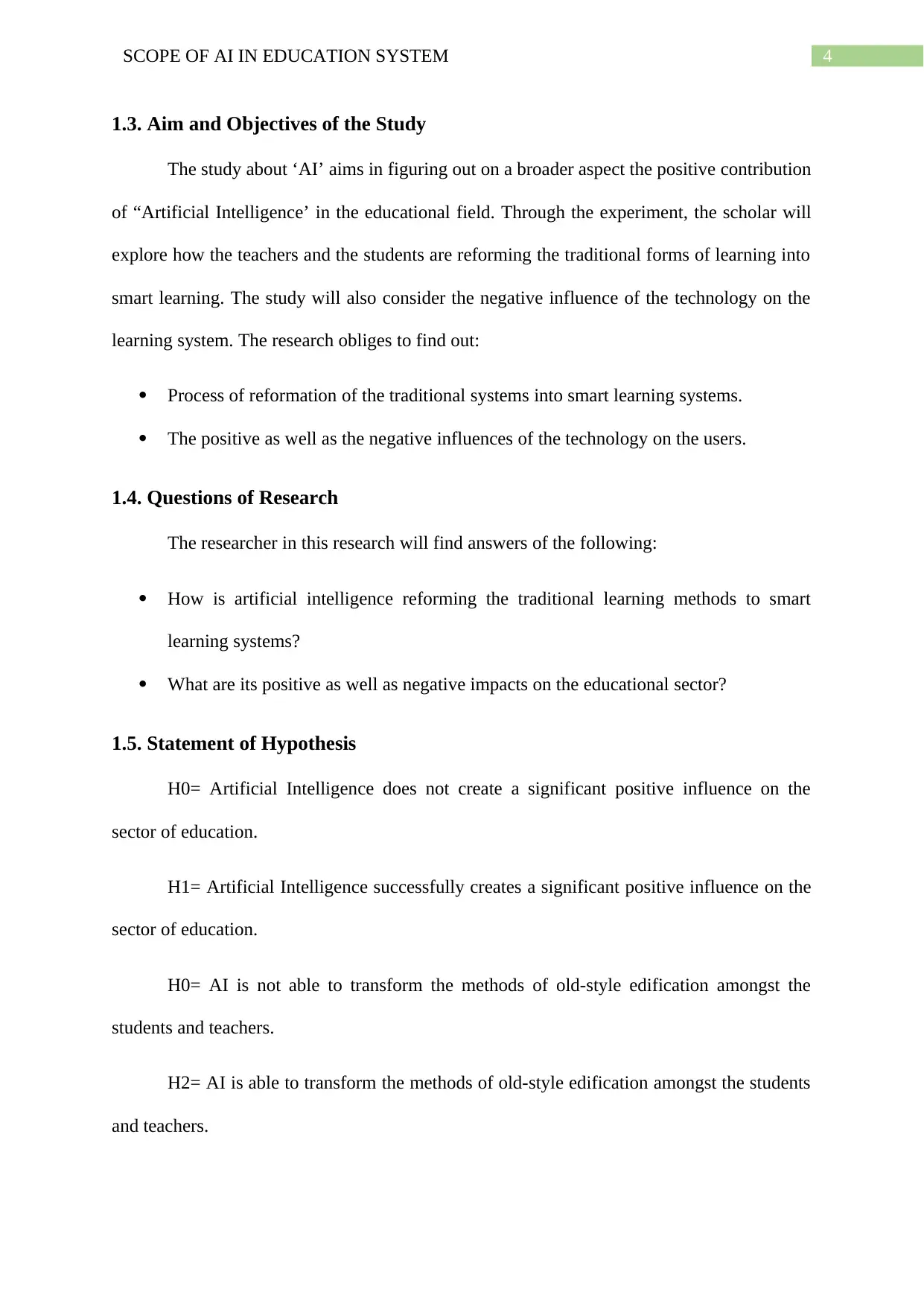
4SCOPE OF AI IN EDUCATION SYSTEM
1.3. Aim and Objectives of the Study
The study about ‘AI’ aims in figuring out on a broader aspect the positive contribution
of “Artificial Intelligence’ in the educational field. Through the experiment, the scholar will
explore how the teachers and the students are reforming the traditional forms of learning into
smart learning. The study will also consider the negative influence of the technology on the
learning system. The research obliges to find out:
Process of reformation of the traditional systems into smart learning systems.
The positive as well as the negative influences of the technology on the users.
1.4. Questions of Research
The researcher in this research will find answers of the following:
How is artificial intelligence reforming the traditional learning methods to smart
learning systems?
What are its positive as well as negative impacts on the educational sector?
1.5. Statement of Hypothesis
H0= Artificial Intelligence does not create a significant positive influence on the
sector of education.
H1= Artificial Intelligence successfully creates a significant positive influence on the
sector of education.
H0= AI is not able to transform the methods of old-style edification amongst the
students and teachers.
H2= AI is able to transform the methods of old-style edification amongst the students
and teachers.
1.3. Aim and Objectives of the Study
The study about ‘AI’ aims in figuring out on a broader aspect the positive contribution
of “Artificial Intelligence’ in the educational field. Through the experiment, the scholar will
explore how the teachers and the students are reforming the traditional forms of learning into
smart learning. The study will also consider the negative influence of the technology on the
learning system. The research obliges to find out:
Process of reformation of the traditional systems into smart learning systems.
The positive as well as the negative influences of the technology on the users.
1.4. Questions of Research
The researcher in this research will find answers of the following:
How is artificial intelligence reforming the traditional learning methods to smart
learning systems?
What are its positive as well as negative impacts on the educational sector?
1.5. Statement of Hypothesis
H0= Artificial Intelligence does not create a significant positive influence on the
sector of education.
H1= Artificial Intelligence successfully creates a significant positive influence on the
sector of education.
H0= AI is not able to transform the methods of old-style edification amongst the
students and teachers.
H2= AI is able to transform the methods of old-style edification amongst the students
and teachers.
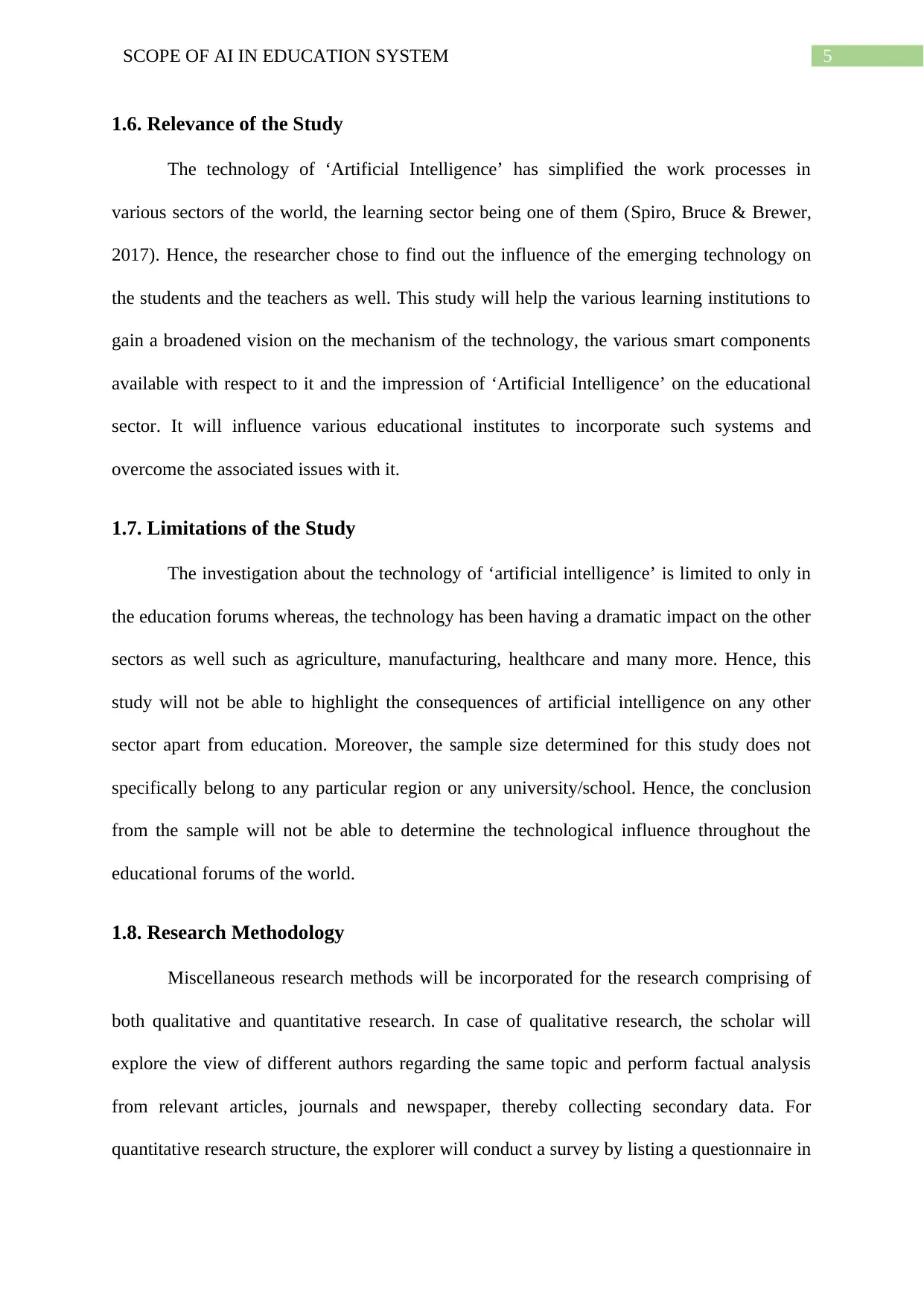
5SCOPE OF AI IN EDUCATION SYSTEM
1.6. Relevance of the Study
The technology of ‘Artificial Intelligence’ has simplified the work processes in
various sectors of the world, the learning sector being one of them (Spiro, Bruce & Brewer,
2017). Hence, the researcher chose to find out the influence of the emerging technology on
the students and the teachers as well. This study will help the various learning institutions to
gain a broadened vision on the mechanism of the technology, the various smart components
available with respect to it and the impression of ‘Artificial Intelligence’ on the educational
sector. It will influence various educational institutes to incorporate such systems and
overcome the associated issues with it.
1.7. Limitations of the Study
The investigation about the technology of ‘artificial intelligence’ is limited to only in
the education forums whereas, the technology has been having a dramatic impact on the other
sectors as well such as agriculture, manufacturing, healthcare and many more. Hence, this
study will not be able to highlight the consequences of artificial intelligence on any other
sector apart from education. Moreover, the sample size determined for this study does not
specifically belong to any particular region or any university/school. Hence, the conclusion
from the sample will not be able to determine the technological influence throughout the
educational forums of the world.
1.8. Research Methodology
Miscellaneous research methods will be incorporated for the research comprising of
both qualitative and quantitative research. In case of qualitative research, the scholar will
explore the view of different authors regarding the same topic and perform factual analysis
from relevant articles, journals and newspaper, thereby collecting secondary data. For
quantitative research structure, the explorer will conduct a survey by listing a questionnaire in
1.6. Relevance of the Study
The technology of ‘Artificial Intelligence’ has simplified the work processes in
various sectors of the world, the learning sector being one of them (Spiro, Bruce & Brewer,
2017). Hence, the researcher chose to find out the influence of the emerging technology on
the students and the teachers as well. This study will help the various learning institutions to
gain a broadened vision on the mechanism of the technology, the various smart components
available with respect to it and the impression of ‘Artificial Intelligence’ on the educational
sector. It will influence various educational institutes to incorporate such systems and
overcome the associated issues with it.
1.7. Limitations of the Study
The investigation about the technology of ‘artificial intelligence’ is limited to only in
the education forums whereas, the technology has been having a dramatic impact on the other
sectors as well such as agriculture, manufacturing, healthcare and many more. Hence, this
study will not be able to highlight the consequences of artificial intelligence on any other
sector apart from education. Moreover, the sample size determined for this study does not
specifically belong to any particular region or any university/school. Hence, the conclusion
from the sample will not be able to determine the technological influence throughout the
educational forums of the world.
1.8. Research Methodology
Miscellaneous research methods will be incorporated for the research comprising of
both qualitative and quantitative research. In case of qualitative research, the scholar will
explore the view of different authors regarding the same topic and perform factual analysis
from relevant articles, journals and newspaper, thereby collecting secondary data. For
quantitative research structure, the explorer will conduct a survey by listing a questionnaire in
⊘ This is a preview!⊘
Do you want full access?
Subscribe today to unlock all pages.

Trusted by 1+ million students worldwide
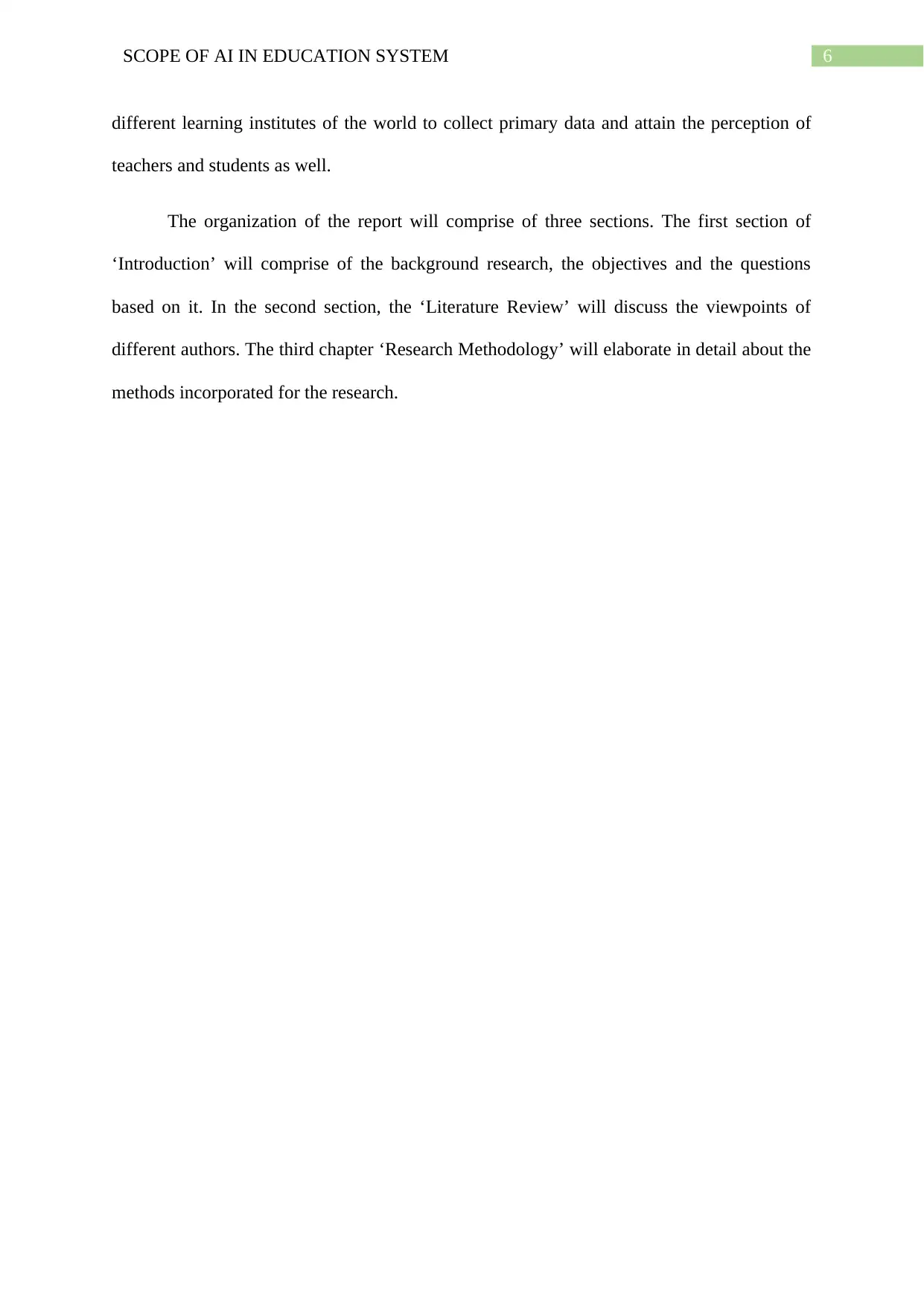
6SCOPE OF AI IN EDUCATION SYSTEM
different learning institutes of the world to collect primary data and attain the perception of
teachers and students as well.
The organization of the report will comprise of three sections. The first section of
‘Introduction’ will comprise of the background research, the objectives and the questions
based on it. In the second section, the ‘Literature Review’ will discuss the viewpoints of
different authors. The third chapter ‘Research Methodology’ will elaborate in detail about the
methods incorporated for the research.
different learning institutes of the world to collect primary data and attain the perception of
teachers and students as well.
The organization of the report will comprise of three sections. The first section of
‘Introduction’ will comprise of the background research, the objectives and the questions
based on it. In the second section, the ‘Literature Review’ will discuss the viewpoints of
different authors. The third chapter ‘Research Methodology’ will elaborate in detail about the
methods incorporated for the research.
Paraphrase This Document
Need a fresh take? Get an instant paraphrase of this document with our AI Paraphraser
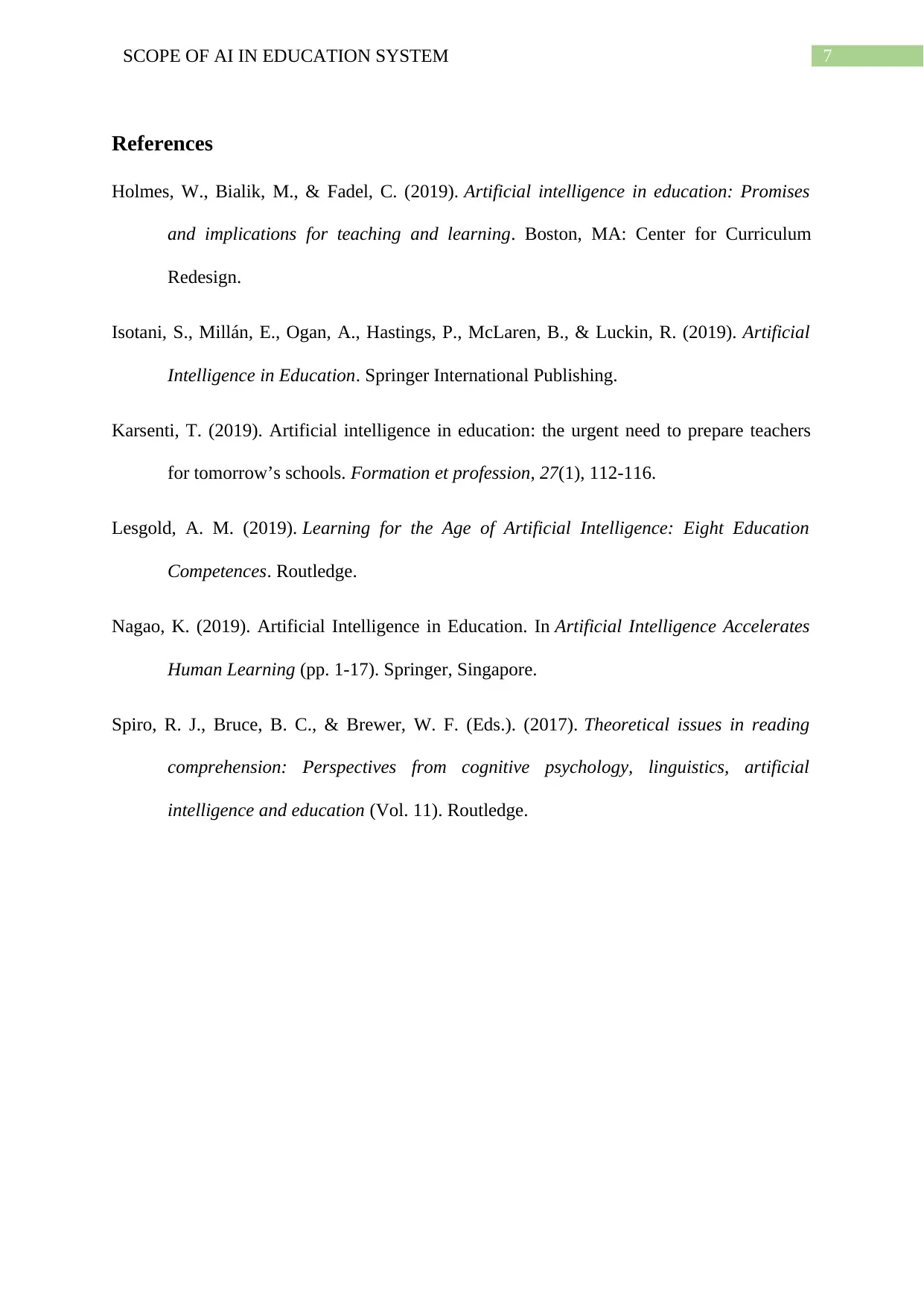
7SCOPE OF AI IN EDUCATION SYSTEM
References
Holmes, W., Bialik, M., & Fadel, C. (2019). Artificial intelligence in education: Promises
and implications for teaching and learning. Boston, MA: Center for Curriculum
Redesign.
Isotani, S., Millán, E., Ogan, A., Hastings, P., McLaren, B., & Luckin, R. (2019). Artificial
Intelligence in Education. Springer International Publishing.
Karsenti, T. (2019). Artificial intelligence in education: the urgent need to prepare teachers
for tomorrow’s schools. Formation et profession, 27(1), 112-116.
Lesgold, A. M. (2019). Learning for the Age of Artificial Intelligence: Eight Education
Competences. Routledge.
Nagao, K. (2019). Artificial Intelligence in Education. In Artificial Intelligence Accelerates
Human Learning (pp. 1-17). Springer, Singapore.
Spiro, R. J., Bruce, B. C., & Brewer, W. F. (Eds.). (2017). Theoretical issues in reading
comprehension: Perspectives from cognitive psychology, linguistics, artificial
intelligence and education (Vol. 11). Routledge.
References
Holmes, W., Bialik, M., & Fadel, C. (2019). Artificial intelligence in education: Promises
and implications for teaching and learning. Boston, MA: Center for Curriculum
Redesign.
Isotani, S., Millán, E., Ogan, A., Hastings, P., McLaren, B., & Luckin, R. (2019). Artificial
Intelligence in Education. Springer International Publishing.
Karsenti, T. (2019). Artificial intelligence in education: the urgent need to prepare teachers
for tomorrow’s schools. Formation et profession, 27(1), 112-116.
Lesgold, A. M. (2019). Learning for the Age of Artificial Intelligence: Eight Education
Competences. Routledge.
Nagao, K. (2019). Artificial Intelligence in Education. In Artificial Intelligence Accelerates
Human Learning (pp. 1-17). Springer, Singapore.
Spiro, R. J., Bruce, B. C., & Brewer, W. F. (Eds.). (2017). Theoretical issues in reading
comprehension: Perspectives from cognitive psychology, linguistics, artificial
intelligence and education (Vol. 11). Routledge.
1 out of 8
Related Documents
Your All-in-One AI-Powered Toolkit for Academic Success.
+13062052269
info@desklib.com
Available 24*7 on WhatsApp / Email
![[object Object]](/_next/static/media/star-bottom.7253800d.svg)
Unlock your academic potential
Copyright © 2020–2026 A2Z Services. All Rights Reserved. Developed and managed by ZUCOL.





